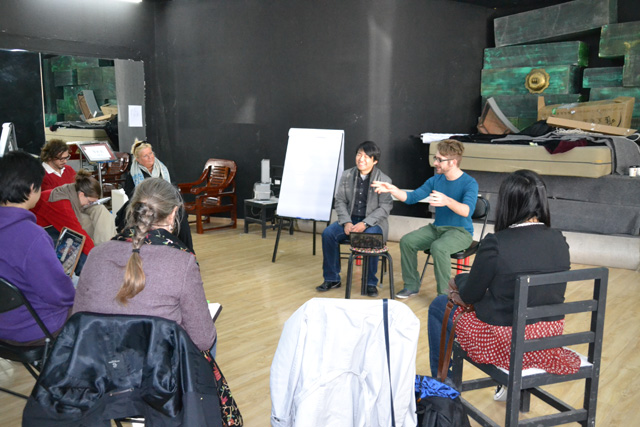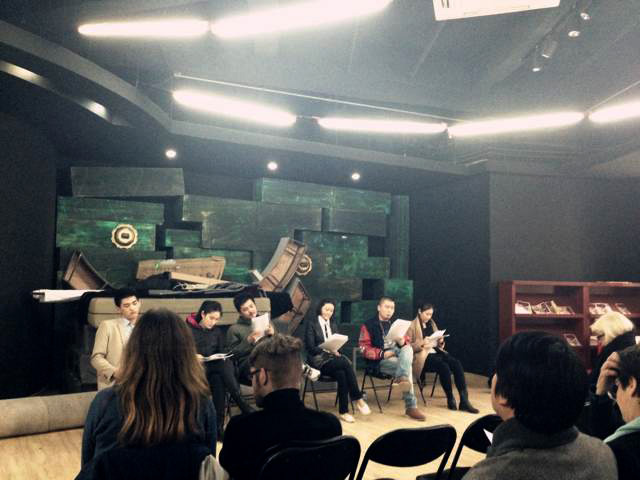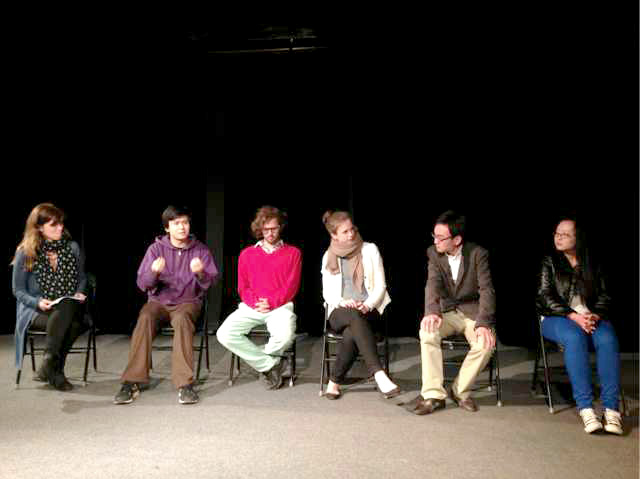-
Calendar 2026
Calendar 2025
Calendar 2024
Calendar 2023
Calendar 2022
Calendar 2021
Calendar 2020
-
Children of Ginko – Preview
31 October, Shanghai
-
Children of Ginko – Premiere
7-8 November, Shanghai,
Calendar 2019
-
Dance Dramaturgy 2.1
23-23 April, Aosai Space, Dali
-
New Text New Stage – “A Deal” Australian Premiere
23-31 August, Sydney
Calendar 2018
-
Web Traffic — A Multimedia Dance Theatre
Jan.5-7th , Shanghai International Dance Center
-
China ComingOUT – Creative Writing for LGBTQ Youth
31st Jan.-4th Feb. , Destination, Beijing.
-
SPEAK OUT: #1 LGBTQ&Perfromance BJ
7th, April , Italian Institute of Culture, Beijing
-
SPEAK OUT: #2 Performance&Performativity
8th, April , Xiaozhong Bookstore, Beijing
-
SPEAK OUT: #1 LGBTQ&Perfromance SH
10th, April , NEXTMIXING, Shanghai
-
SPEAK OUT: #1 LGBTQ&Perfromance GZ
12th, April , Ergao Dance Production Group, Guangzhou
-
SPEAK OUT : #3 Gender, Documentary and Activism
19th, May, Bookworm, Beijing
-
China ComingOUT – Creative Writing for LGBTQ Youth
23rd, May-26th, May , Zizai Studio, Shanghai
-
LookOUT- Arts Festival on Gender
July 6-15, 2018, Beijing, 798 Art District
-
Let You Be rerun in Beijing Penghao Theatre
26-27th, July , Penghao Theatre, Beijing
-
I Disappear Premiere in Beijing
28th, 29th, July , Penghao Theatre, Beijing
-
Dance Dramaturgy Workshop I
27th,Aug.-2nd, Sep., Free Theatre Alliance Rehearsal Center, Beijing
-
China ComingOUT——Creative Writing for LGBTQ Youth
25th-28th, October , There Art Center, Guangzhou
-
Dance Dramaturgy Workshop II
30th, Oct.-1st, Nov. , Free Theatre Alliance Rehearsal Center
-
MOVING WOR(L)DS – International forum on theatre & migration
7-17th December , Nanjing University, Nanjing, Jiangsu Province, China
Calendar 2017
-
“When Swallows Cry” South African Premiere Reviews
January, Market Theatre Complex, Newtown Johannesburg Gauteng South Africa
-
Frozen Songs Excerpts Presented at Shanghai Project Chapter 2 Opening
April , Shanghai Himalayas Museum
-
The Returning/ Winterreise with Chinese Cast Premiere in Shanghai
21st-23th, July, Shanghai Huangpu Theatre; 28th-29th, July, Penghao Theatre Beijing
-
I Disappear Stage Reading in Penghao Theatre Beijing
July 26th, 14:30/19:30 Penghao Theatre
-
Frozen Songs Premiere at The Arctic Theatre
September,7th, Tromsø, Norway, Arctic Theatre(Hålogaland Teater )
-
Disco-Teca at STOFF – Stockholm Fringe Festival
9th, September, Teater Tre, Stockholm, Sweden
-
Let You Be Premiere in Beijing
September, 25th-26th, 7:30pm Qinglan Theatre
-
Let You Be Tour in Hangzhou Contemporary Theatre Festival
28th, September, Zhejiang Province Culture Center Small Theatre.
-
Disco-Teca at We Festival of Future Shanghai
October, 7th-8th, No.6 Space, West Bund Camp 3399, Shanghai
-
New Text New Stage II Tatarstan Production Premiere
14th, 15th, 17th, October, 2017, Galiaskar Kamal Tatar National Academic Theatre, Tatarstan
-
New Text New Stage II Chinese/American Production Coming Up
Nov 15th-Dec.10th, Urban Stages Theatre, New York. Sep.24th-30th, Nanjing University, Jiangsu, China.
-
About My Parents and Their Child Touring in Shanghai
December, 9th-10th, Shanghai Dramatic Art Center 1933 Micro Theatre.
-
Contextualizing Dance Dramaturgy – Workshop Series BJ
Dec. 22nd , Goethe Institut China, Beijing
-
Contextualizing Dance Dramaturgy – Workshop Series GZ
Dec. 25th , Ergao Dance Production Group, Guangzhou
-
Contextualizing Dance Dramaturgy – Workshop Series SH
Dec. 30th , Camp 3399 #6 Space, Shanghai
Calendar 2016
-
Night Shift, Beijing rerun
8-9 January, Qinglan theatre, Beijing
-
Ghost 2.0, Beijing rerun
21st-24th, Jan. , Beijing Tianqiao Performing Arts Center
-
SEEDS – A Global Art and Media Project
1-11th, March, Drum Tower West Theatre, Beijing, China
-
Sleeping Beauties—Dancing & Multimedia Workshop Demonstration
6th, March, Drum Tower West Theatre, BJ
-
NEW TEXT, NEW STAGE II – Session 3
20th-26th, March , Guangzhou Dramatic Art Center. There Art Space in GZ
-
Free Theater Alliance – Launch of 1-2-3 Theatre
April, 18th, Qinglan Theater, Beijing
-
Jon Fosse’s Dream of Autumn BOOK LAUNCH
23 April, JEWELVARY Art & Boutique
-
PRACTICAL RETHORIC Workshop (SH)
6月19日, Internet Education Plaza, Shanghai
-
PRACTICAL RETHORIC Open Demonstration (GZ)
July 2, There Art Space, Guangzhou
-
Disco-teca Open Presentation (GZ)
July 9, Guangdong Times Museum, Guangzhou
-
PRACTICAL RETHORIC Open Demonstration(SH)
July 10, RSDBT. Shanghai
-
DISCO-TECA in Shanghai
July 12-13, 1933 Micro Theatre
-
Disco-teca Open Presentation (SH)
July 15, RSDBT, Shanghai
-
In the Field of Hope
July 18-19, Gulou West Theatre
-
About My Parent and Their Child
July23-24, Gulou West Theater · Beijing
-
DISCO-TECA in Beijing
July 23-24, Gulou West Theatre
-
Ghost 2.0 at Wuzhen Theatre Festival
13th, 14th October , Wuzhen, China
-
Workshop by Jon Tombre
12th-13th, November, FTA Rehearsal Space, Beijing
Calendar 2015
-
Practical Rhetoric – Workshop 1
13-18 March, Beijing, Here&Now Studio
-
New Takes on IBSEN
April, 22nd-26th, Shanghai, China
-
Ibsen in One Take – Shanghai 2015
23-24 April, Himalaya Center, Shanghai
-
Night Shift – Norwegian Tour
May 27, 30, Lilehammer, Oslo
-
Practical Rhetoric – Workshop 2
24-28 June, Beijing, Here&Now Studio
-
NEW TEXT, NEW STAGE II – Session 1
13-18 July 2015, Pioneer Theatre, Beijing
-
GHOSTS 2.0
7-9 August, McaM Museum, Shanghai
-
Comedy of Love, Premiere
30th, Sept.-4th, Oct., Penghao Theater, BJ
-
Practical Rhetoric – Workshop 3
3-7 October, Here&Now Studio, Beijing
-
Workshop on Jon Fosse
Oct. 5th-10th , Sheung Wan Municipal Services Building, HK
-
Practical Rhetoric: Launch at Norwegian Embassy
8 October, Norwegian Embassy, Beijing
-
DISCO-TECA, open workshops
10-14 October, Guangzhou
-
Practical Rhetoric:Workshop at Bernard Controls
10 October, Bernard Controls China, Beijing
-
NORA – Norwegian Tour 2015
October 28 - November 3, Bodø; Tromsø; Trondheim
-
DISCO-TECA, premiere
4-5 November, Gender Bender Festival, Bologna
-
Night Shift Guangzhou Tour
13-15th, November, Guangzhou Dramatic Art Center
-
NEW TEXT, NEW STAGE II – Session 2
Nov. 15th-22nd, Shanghai Ming Contemporary Museum, Shanghai Dramatic Art Center
-
Night Shift Shanghai Tour
21-22, November , Shanghai Dramatic Art Center
-
DISCO-TECA: live performances & media feedback
December, 17th, DPAC, Malaysia
Calendar 2014
-
Artists’ Talk Series 1: Architecture and Scenography
January 21 - 27th, Ibsen International Office, Beijing
-
Artists’ Talk Series 1: New Media and Theatre
29th March, Ibsen International Office, Beijing
-
New Texts, New Stage – Session 3
5th - 10th May 2014, Pioneer Theatre, Beijing
-
HEDVIG from the Wild Duck – Oslo
14-16th August, Oslo Opera House, Norway
-
GHOSTS 2.0
6-7 September, Beehive theatre, Beijing
-
Artists’ Talk Series 1: Drama, Communication and Society
7th September, Ibsen International Office, Beijing
-
Ibsen in One Take – Ibsen Festival Oslo
12th September, Oslo,
-
Night Shift – Beijing Fringe Festival
16th-17th September, Beijing Fringe Festival
-
Ibsen in One Take – OzAsia Festival
16-17th September, Adelaide,
-
The phenomenon: Hedda Gabler
11th-12th October, Penghao Theatre, Beijing
-
Night Shift – Beijing Rerun
13th October, Gulou West Theatre. Beijing
-
NORA – World premiere
30-31 October, Tianjin Grand Theatre, Tianjin
-
Jo Strømgren Kompanis at Guandong Modern Dance Festival
November 10-12,2014, Xinghai PA Garden,Guang Zhou, China
-
Jon Fosse’s Blossoms In Shanghai International Contemporary Theatre Festival 2014
November 21-29,2014, Shanghai Dramatic Arts Centre, China
Calendar 2013
-
New Texts, New Stage – Session1
16th - 20th April, Star Theatre, Beijing
-
HEDVIG from the Wild Duck
28-29th June, Kwai Tsing Theatre Auditorium, Hong Kong
-
HEDVIG from the Wild Duck – Beijing
23rd July, People Liberation's Army Theatre, Beijing
-
Carcass
26th July 2013, Star Theatre, Beijing
-
Ibsen in One Take – Netherlands
27 - 28th September, Rotterdam
-
Ibsen in One Take – China tour
13 - 16 November, Guangzhou and Shanghai
-
New Texts, New Stage – Session2
23rd November - 1st December, Penghao Theatre, Beijing
-
The Name – Jon Fosse
28 November - 15 December, Shanghai
Calendar 2012
-
The Jon Fosse Project in China
-
The Name
7-11 March, 2012, New Space Theatre, Shanghai
-
Dance Workshop in Beijing with Johannessen for LDTX
13 - 25 April 2012, Beijing
-
Writing Text for Opera
October 11th - 13th 2012, Bergen
-
Field Works
November 22nd - 30th, Macau, Guangzhou, Shenzhen
-
Ibsen in one take
28th November - 1st December, Beijing
-
RETURN _ a devised dance piece
27th November - 6th December, Guangzhou Modern Dance Festival; Singapore Connect Festival.
Calendar 2011
-
Workshop collaboration
23-24 April, Tianqiao Theatre Beijing
-
Masterclass by choreographer Ingun Bjørnsgaard
25 July, Guangzhou
-
Building International Network – seminar Guangdong Moderne Dance Festival
26 July at 11.00, Guangzhou
-
The Name by Jon Fosse, production The New Norwegian Theatre
23 September at 19.15, Venue: The New Stage at Shanghai Theatre Academy, 630 Huashan Rd, Shanghai
-
The Name by Jo Fosse, production The New Norwegian Theatre
24 September at 15 and 19.15, Venue: The New Stage at Shanghai Theatre Academy, 630 Huashan Rd, Shanghai
-
The second Ibsen Festival for Students in China
21 – 23 October, Nanjing
-
The Jon Fosse Project in China
November 4, 2011, 20:00 , The New Space at Shanghai Theatre Acedemy, 630 Huashan Rd., Shanghai, in collaboration with TTS Group
-
International Seminar: Staging Ibsen Today
31 October – 4 November, Beijing
Calendar 2010
-
Ibsen live in China – an exhibition
5 October - 4 November, Hangzhou, Shanghai, Nanjing and Beijing
-
The Lady From the Sea
5 and 6 October 2010, Hangzhou
-
The Lady From the Sea
14 and 15 October, Yi Fu Stage, Shanghai
-
Symposium on Ibsen and Interculturalism in China
15 October, Shanghai Theatre Academy
-
A Doll’s House
22, 23 and 24 October, Capital Theatre, Beijing
-
China International Ibsen Festival for Students
22, 23 and 24 October, Nanjing University
-
Workshop based on Jon Fosse’s work
25 - 29 October, Shanghai Theatre Academy
-
Someone Is Going to Come by Jon Fosse
26 October to 4 November 2010, New Theatre Stage, Shanghai Theatre Academy
-
New Texts, New Stage – SESSION 1
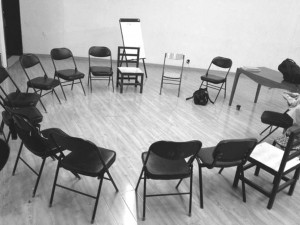
workshop for playwrights
Concept: Inger Buresund, Hege Randi Tørressen
Project management: Fabrizio Massini
Dramaturges: Hege Randi Tørressen, Bodil Kvamme
Guest lecturers: Qu Shifei, Shao Zehui
Playwrights: Oda Fiskum, Liu Yinshi, Marco Demian Vitanza, Zhao Xun
Actors: Dong Ziyi, He Yang, Wu Genghua, Yi Hang, Yu Yang, Wang Xiaodi
Interpreters: Li Yuan, Fabrizio Massini
Translators: Zhang Qiong (EN-ZH), Fabrizio Massini (ZH-EN)
OVERVIEW:
The workshop for playwrights “New texts, new stage” took place in Beijing from the 16th until the 20th of April 2013. Four young playwrights (two from China and two from Norway) were invited to take part in the workshop. The selected playwrights are Zhao Xun, Yinshi, Oda Fiskum and Marco Demian Vitanza.
All the four writers were required to submit one of their works which they would like to work on. The fours texts were firstly translated (the Chinese scripts into English and vice-versa) and then emailed to all the participants involved in the workshop, so that everybody could do some preliminary work before the first meeting in Beijing. After a first plenary session, the participants were divided into two groups consisting of one Chinese and one Norwegian writer. Two experienced dramaturges, Hege Randi Tørressen and Bodil Kvamme, lead one group each, assisted by professional interpreters with experience in theatre practice to overcome the language barrier.
DAY1: On the first day all the texts were read aloud by the six actors of the National Theatre of China’s troupe. The actors were also asked to give their views on the plays.
DAY 2 – 4: During the following three days, the playwrights were asked to deliver five pages of new material each day. The new material had to be sent for translation by 7 PM, so that the two translators could send the translation back within the night and allow the two dramaturges to prepare the next morning’s session. The actors joined the groups also on day 3 to read aloud the new material and provide their personal feedback.
Besides the sessions dedicated to script-writing, the workshop also included a series of lectures. Ibsen International’s dramaturge Hege Randi Tørressen gave a lecture on “Dramaturgy from a Western Perspective”; Qu Shifei, professor of dramatic literature at the Central Academy od Drama of Beijing, gave a lecture on “Chinese Drama”; Shao Zehui, Chinese theatre director, gave a lecture about his work with the Beijing Fringe Festival.
DAY 5: On the fifth day of the workshop a group of guests were invited to attend a reading consisting of selected excerpts from the four scripts. Afterwards, there was a Q&A session about the workshop, its participants and the four texts.
OUTCOME: This has been an enriching and challenging experience for everybody involved in the workshop. Through a substantial daily workload, strict deadlines, continuous discussions and exchange with the other participants, the four playwrights were pushed to explore different possibilities, to develop their text along different lines.
NEXT STEPS OF THE PROJECT:
The playwrights will work autonomously on their scripts for the next six months. In November 2013, during SESSION 2, they will gather again in Beijing for a further revision and reworking of the drafts. The final drafts will be handed in by the spring of 2014 and used as the departure point for a WORKSHOP ON DIRECTION, with the final objective being the staging of full-lenght plays in 2015.
FEEDBACK FROM THE PARTICIPANTS:
Bodil Kvamme, Norwegian dramaturge:
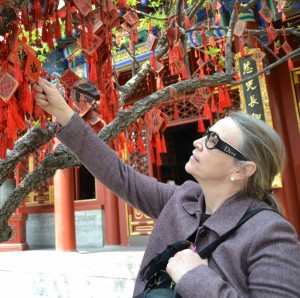 “I mentored two playwrights, Marco Demian Vitanza and Zhao Xun. I had never met either of them, and it was also my first encounter with their writing and working method. It was fantastic to meet two writers with such different backgrounds and personal experiences. I think the workshop has been at the same time a challenge and an occasion of professional growth for both of them. The conversations between the two of them have been instructive and hopefully will gave them a new insight in their own writing. I have met two writers who were very attentive, creative, proactive and open for input!”
“I mentored two playwrights, Marco Demian Vitanza and Zhao Xun. I had never met either of them, and it was also my first encounter with their writing and working method. It was fantastic to meet two writers with such different backgrounds and personal experiences. I think the workshop has been at the same time a challenge and an occasion of professional growth for both of them. The conversations between the two of them have been instructive and hopefully will gave them a new insight in their own writing. I have met two writers who were very attentive, creative, proactive and open for input!”
Liu Yinshi, Chinse playwright:
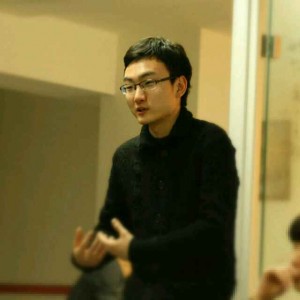 “In such a short time, I have obtained much from Ibsen International’s workshop.
“In such a short time, I have obtained much from Ibsen International’s workshop.
Firstly, the approach of this workshop is different from the traditional script-writing methods adopted in China, that is, a playwright in his own room, writing a piece on his own, maybe exchanging ideas and suggestions with other playwrights only. Conversely, in this workshop the actors were there from the very beginning and during the whole process. Having the actors reading the text aloud during the writing process, bringing up their suggestions and personal impressions, helped us to make the scripts ‘ready to be staged’ from the offset.
This workshop was very intense, it put us under a lot of pressure but also gave us a strong motivation. Exploring the different possibilities to expand a script creates even more expectations towards the final texts that will come out of this work!”
Marco Demian Vitanza, Norwegian playwright:
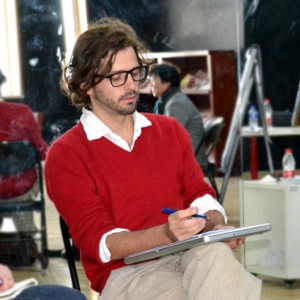 “I benefitted a lot from the workshop. I was challenged by dramaturge Bodil Kvamme to try out different ways of opening up the text, and this was both interesting and fruitful. We were asked to write five new pages each day. This didn’t fit my process every day, but it was nonetheless an interesting challenge. The feedback from Kvamme was both relevant and inspiring. I wish the workshop was longer, but I believe we got pretty far in such a short time.
“I benefitted a lot from the workshop. I was challenged by dramaturge Bodil Kvamme to try out different ways of opening up the text, and this was both interesting and fruitful. We were asked to write five new pages each day. This didn’t fit my process every day, but it was nonetheless an interesting challenge. The feedback from Kvamme was both relevant and inspiring. I wish the workshop was longer, but I believe we got pretty far in such a short time.
I learned a lot from listening to how the Chinese playwrights and actors reflect on their jobs and how they perceive Beijing. The connections between topics, aesthetics and society were strikingly present. Although there was not enough time to allow the very city of Beijing to affect my work, I believe its impressions will give impulses to my future work – especially considering China’s current role. Getting to know actors and playwrights from such a distant country was also a great pleasure, and I hope to see them again.”
Zhao Xun, Chinese playwright:
 “Firstly, from a script-writing perspective, an aspect that affected me deeply was the close work and the exchange of ideas between me and the other three playwrights. Before this experience, most of the time I write the structure and the plot of my plays on my own. The writing would follow my own way of thinking, and it would stay that way afterwards. However, working in group with playwrights from other countries and other gender (male) helped me to see the blind spots and the weaknesses in my own writing. Listening to their ideas stimulated me, shifted my train of thought towards different directions, gave me the inspiration to develop and structure my play in many different ways.”
“Firstly, from a script-writing perspective, an aspect that affected me deeply was the close work and the exchange of ideas between me and the other three playwrights. Before this experience, most of the time I write the structure and the plot of my plays on my own. The writing would follow my own way of thinking, and it would stay that way afterwards. However, working in group with playwrights from other countries and other gender (male) helped me to see the blind spots and the weaknesses in my own writing. Listening to their ideas stimulated me, shifted my train of thought towards different directions, gave me the inspiration to develop and structure my play in many different ways.”
Oda Fiskum, Norwegian playwright:
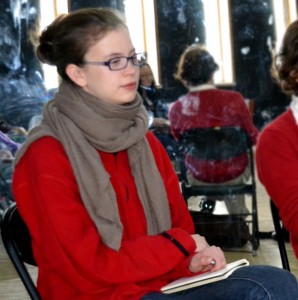 “The most unique aspect of the workshop was the opportunity to experiment with my own text within a professional context without the pressure of a production looming overhead. To be able to work with fellow writers from both China and Norway on top of this made for a new and valuable experience for me. We had complete freedom to try new approaches because the final goal was not to have a performance-ready script at the end.
“The most unique aspect of the workshop was the opportunity to experiment with my own text within a professional context without the pressure of a production looming overhead. To be able to work with fellow writers from both China and Norway on top of this made for a new and valuable experience for me. We had complete freedom to try new approaches because the final goal was not to have a performance-ready script at the end.
During the workshop I was constantly pushed forward while at the same time being able to draw inspiration from my fellow writers. Hege and the actors joined efforts in pushing me out of my comfort zone and, though it felt very uncomfortable at first, it resulted in some decent material. I have now gained a lot of new tools and possible ways forward, in my general production as well as with this particular text.
A lot of interesting conversations happened between actors, dramaturges, and the other playwrights. We argued, agreed, opened up, and gained a lot of new perspectives, both on our own and the other country’s contemporary situation. After the workshop we have all stayed in touch, kept exchanging ideas and criticism, and look forward to the next ìchapter’ ”.
PICTURES FROM THE WORKSHOP:

